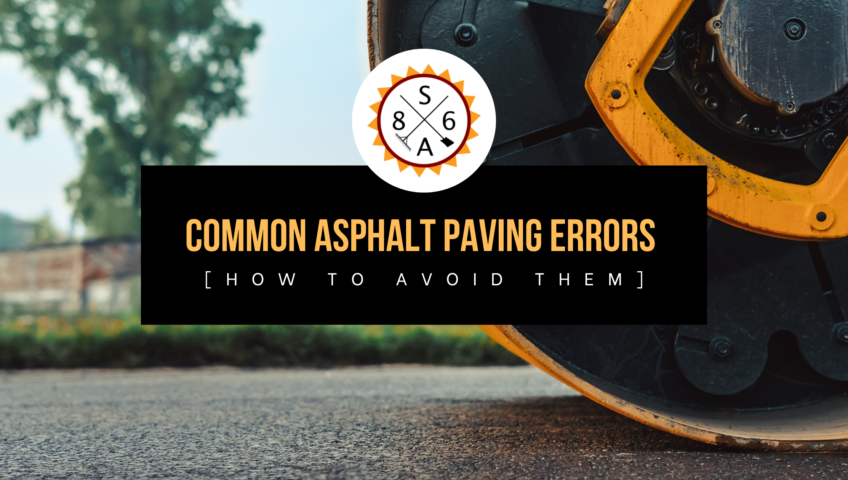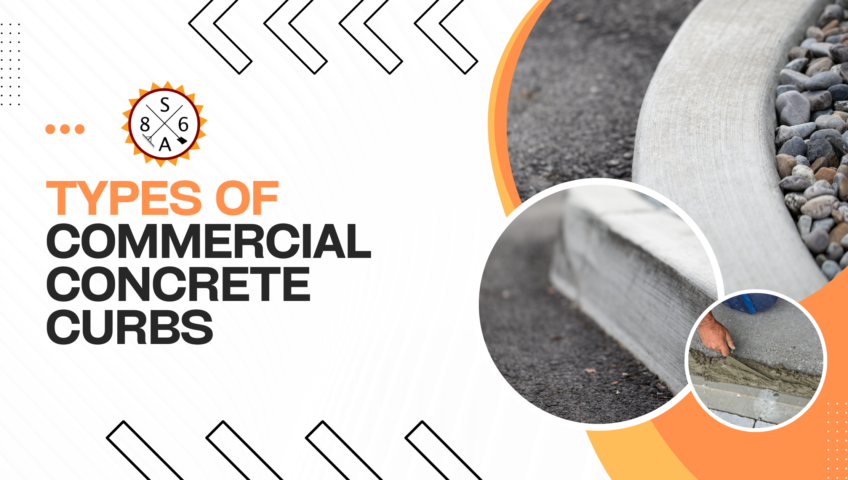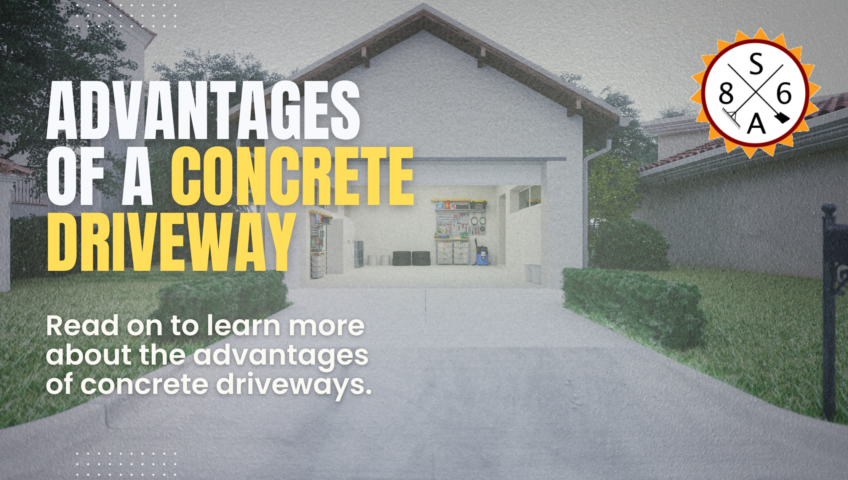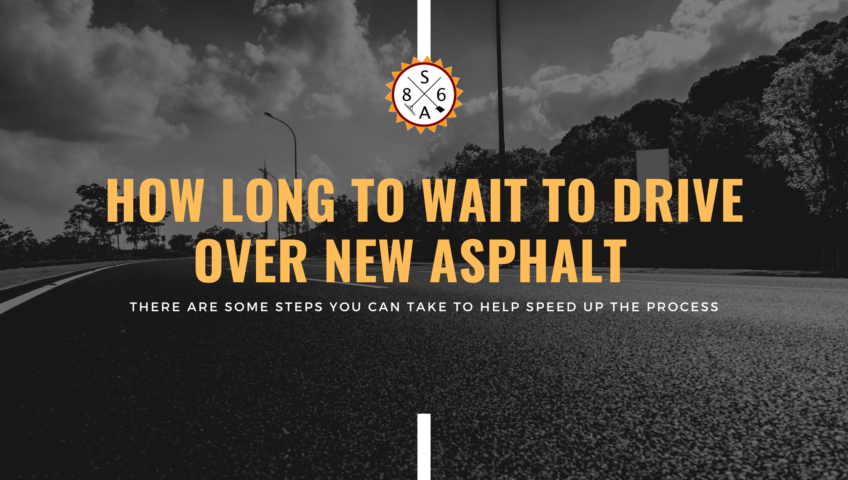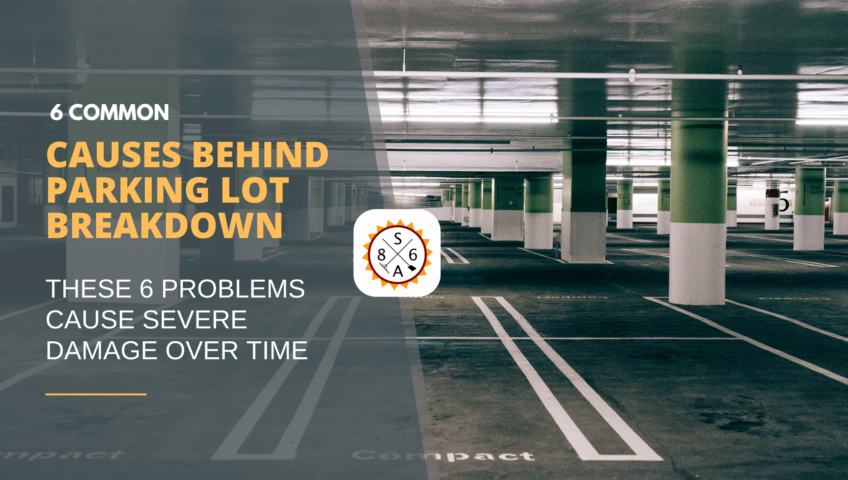
6 COMMON CAUSES BEHIND PARKING LOT BREAKDOWN
If you’re the owner or manager of a building with a parking lot, you may have noticed that it’s starting to show signs of wear. An asphalt parking lot is exposed to several elements that can cause severe damage over time.
1. Harsh Weather Conditions
Freezing temperatures can cause water from rain and snow to freeze, causing micro cracks in the asphalt to expand. Over time, this will cause the surface of the parking lot to crumble.
2. Dirt, Debris, or Engine Oil Spills
Just about any type of dirt or debris can trap moisture, preventing it from evaporating or draining properly. Even oil and other non water substances can be absorbed by the asphalt coating on a parking lot. Over time, this moisture seeps into the asphalt, causing fissures as the temperature drops and the moisture freezes.
3. Poor Drainage System
A faulty or clogged drainage system will prevent water from draining properly. Water that ponds on top of the asphalt can cause a number of problems. In addition to the aforementioned freezing and cracking, the debris, oil, and acids that are trapped by puddles of water can wear away at the asphalt covering of a parking lot. Be aware that in addition to fixing the damage that has been done by the standing water, a property owner will also need to fix the drainage system. This may be as simple as removing debris from drain inlets, but it may also require reconstruction of pipes, outlets, and/or drain fields.
4. Low-Quality Sealants
If a parking lot was never sealed properly by the original asphalt contractors it will likely start to deteriorate much faster than one that was properly sealed. An improperly sealed parking lot will have a lot of cracks as the underlying gravel layers will be exposed to the elements. This means that over time the asphalt coating will wear away and the gravel underneath will be exposed. If the parking lot is in regular use, this will mean that the rocks in this layer will become scattered and uneven. Eventually, parking lots in this state may need to be completely rebuilt, not just resealed.
5. Heavy Vehicles or Machinery
Heavy machinery and other equipment puts a large weight load on the asphalt and gravel layers of a parking lot. Depending on the type of soil the parking lot has been built on, heavy equipment will compact the gravel layers under the asphalt and cause cracking in the top layer of asphalt. In fact, it’s not uncommon for layers under the asphalt to deform without there being any immediate indication of damage. This is because the top layer of asphalt has a small amount of flexibility, allowing heavy equipment to rest on its surface without showing cracks. Under the surface, however, the newly compacted gravel layers will form gaps between the asphalt and the gravel. Over time, this will lead to deformation of the entire parking lot.
6. General Neglect
When a parking lot has been neglected for a long time, it’s likely that it will have all of these problems. Lack of maintenance will cause clogged drainage systems, which will result in an increase in debris and other build up on the surface of the parking lot. Over time, this will result in large parts of the parking lot crumbling and cracking.
If you’re the owner or manager of a building with a parking lot, you may have noticed that it’s starting to show signs of wear. An asphalt parking lot is exposed to several elements that can cause severe damage over time.
1. Harsh Weather Conditions
Freezing temperatures can cause water from rain and snow to freeze, causing micro cracks in the asphalt to expand. Over time, this will cause the surface of the parking lot to crumble.
2. Dirt, Debris, or Engine Oil Spills
Just about any type of dirt or debris can trap moisture, preventing it from evaporating or draining properly. Even oil and other non water substances can be absorbed by the asphalt coating on a parking lot. Over time, this moisture seeps into the asphalt, causing fissures as the temperature drops and the moisture freezes.
3. Poor Drainage System
A faulty or clogged drainage system will prevent water from draining properly. Water that ponds on top of the asphalt can cause a number of problems. In addition to the aforementioned freezing and cracking, the debris, oil, and acids that are trapped by puddles of water can wear away at the asphalt covering of a parking lot. Be aware that in addition to fixing the damage that has been done by the standing water, a property owner will also need to fix the drainage system. This may be as simple as removing debris from drain inlets, but it may also require reconstruction of pipes, outlets, and/or drain fields.
4. Low-Quality Sealants
If a parking lot was never sealed properly by the original asphalt contractors it will likely start to deteriorate much faster than one that was properly sealed. An improperly sealed parking lot will have a lot of cracks as the underlying gravel layers will be exposed to the elements. This means that over time the asphalt coating will wear away and the gravel underneath will be exposed. If the parking lot is in regular use, this will mean that the rocks in this layer will become scattered and uneven. Eventually, parking lots in this state may need to be completely rebuilt, not just resealed.
5. Heavy Vehicles or Machinery
Heavy machinery and other equipment puts a large weight load on the asphalt and gravel layers of a parking lot. Depending on the type of soil the parking lot has been built on, heavy equipment will compact the gravel layers under the asphalt and cause cracking in the top layer of asphalt. In fact, it’s not uncommon for layers under the asphalt to deform without there being any immediate indication of damage. This is because the top layer of asphalt has a small amount of flexibility, allowing heavy equipment to rest on its surface without showing cracks. Under the surface, however, the newly compacted gravel layers will form gaps between the asphalt and the gravel. Over time, this will lead to deformation of the entire parking lot.
6. General Neglect
When a parking lot has been neglected for a long time, it’s likely that it will have all of these problems. Lack of maintenance will cause clogged drainage systems, which will result in an increase in debris and other build up on the surface of the parking lot. Over time, this will result in large parts of the parking lot crumbling and cracking.

